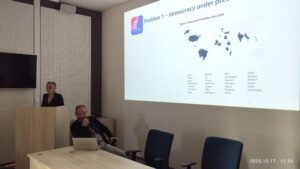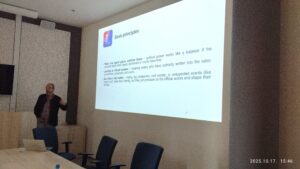Last week, October 15-17, 2025, TWIN4DEM project members contributed to the Annual Meeting of the Hungarian Sociological Association with two insightful presentations.
Clara Egger and Raul Magni-Berton presented “TWIN4DEM: A Conceptual Framework for Strengthening Democratic Resilience through Digital Twins.”
Their talk introduced the TWIN4DEM framework, which models democratic systems as interconnected complex network systems (CNS). Each module within this model represents a core democratic function. At the heart of the framework are three key types of institutional agents:
-
Executive actors (e.g., heads of state, ministers)
-
Legislators
-
Judicial actors (in constitutional or administrative courts)
These agents possess either initiative or veto powers, and their actions are influenced by both structural incentives,such as electoral systems, party structures, and socio-economic contexts, and individual preferences, including policy priorities and authoritarian orientations.


Csilla Zsigmond, representing the Hungarian TWIN4DEM team, delivered a presentation entitled “Parallel Institutions: The ‘Soft’ Mechanisms of Executive Aggrandizement — The Case of the Mathias Corvinus Collegium.”Her analysis drew on theoretical perspectives that view de-democratization not only as the dismantling of democratic institutions but also as the gradual transformation of formal and informal power structures that erode pluralism, accountability, and political contestation. The presentation explored how the emergence of parallel institutional systems can contribute to the expansion of executive power.
Both presentations were featured in the session “Autocratic Tendencies and Democratic Responses,” organized by Margit Feischmidt, Márton Gerő, and Dániel Mikecz. Notably, Márton Gerő is also a member of the Hungarian TWIN4DEM team.

